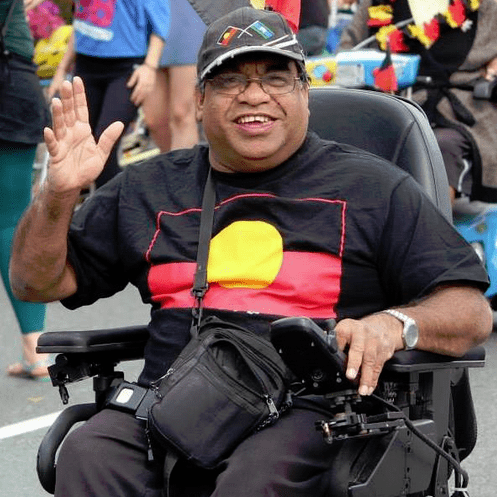
National Reconciliation Week – A yarn with Uncle Willie Prince
The theme for the 2023 National Reconciliation Week, Be a Voice for Generations, encourages us all to be a voice for reconciliation in tangible ways in our everyday lives – where we live, work and socialise. For the work of generations past, and the benefit of generations future, let’s choose to create a more just, equitable and reconciled country for all.
To commemorate National Reconciliation Week, we spoke with QDN Life Member Uncle Willie Prince. Uncle Willie is a Kalkadoon man born on Wakka Wakka country. You can read more about Uncle Willie’s life in another story here.
Uncle Willie Prince was born in Cherbourg in the 1960s, a time when Aboriginal were not counted as citizens of Australia. Uncle Willie is part of the Stolen Generations.
“Because of my disability, the government stepped in and removed me straight away and I was placed in an institution in Brisbane where I lived for most of my life,” says Uncle Willie.
Uncle Willie said that he didn’t really have a voice back then.
“These were very difficult times; during those days it was difficult to get your voice out being a unique person,” says Uncle Willie.
“Often people’s voices were lost because people were not used to listening to or speaking about their culture.”
Willie was raised away from his family and his culture, and he didn't know much about where he came from, or who he was.
“I lost that connection to my culture, my people, my family from an early age,” said Uncle Willie.
When Uncle Willie a bit older, he started thinking about who he was and where he came from.
“I started asking questions,” says Uncle Willie.
“It was a long road to overcome, but I received help from different people along the way.”
Uncle Willie had an opportunity to work at the State Library of Queensland where he learnt more about who he was.
“Working at the library gave me a unique chance to learn more about my culture, where I come from, and who I was,” says Uncle Willie.
“That, along with talking to other indigenous people helped me a great deal.”
“I would get stopped in the street and get asked where I was from, and I'd say, “I'm from this place”, “I'm from that place” and they’d say “Oh yeah, you're related to me” - It was a learning curve.”
Using his voice and being a voice for others
Uncle Willie says it was only later in his life that he started to have a voice and started advocating for people like himself.
“It’s important we come together and advocate on behalf of our people,” says Uncle Willie.
“Many of our mob who don't know how to do all this.”
“Coming together as one big voice, not several voices, we can be louder than ever.”
When asked about his advocacy advice for other First Nations people with disability, Uncle Willie pointed to advocacy organisations.
“There are advocacy organisations left, right and centre that exist,” said Uncle Willie.
“That’s where organisations like Queenslanders with Disability Network and the Aboriginal and Torres Strait Islander Disability Network of Queensland support people to have a voice”.
Uncle Willie says that being a voice for future generations is about getting out there and talking to people and kids about Aboriginal culture and history.
“It’s about education - In the words of indigenous people, ‘our children are our future’”, says Uncle Willie.
“We should be starting to educate people and our children now, so they can carry on the voice.”
The bigger picture – more healing needs to happen
During our conversation Uncle Willie talked about the colonisation of Australia and how Aboriginal people are still healing today. He talked about the story of Yagan, an Aboriginal warrior whose severed head was sent to England and displayed in a museum from 1833 to 1997 when it was finally returned and buried.
“It took decades for the British government to return the warrior back to Australia to be buried properly.
“This is the sort of thing that happened that we haven't quite got over,” explained Uncle Willie.
“It's good that this voice of Parliament is happening but there's more to it, it's a bigger story.”
Uncle Willie says he has seen much change in his lifetime, including three different governments attempt to do what they're doing today: the Uluru Statement from the Heart, Makarrata (Treaty) and the Voice to Parliament.
“That's why I think a lot of people today are a bit skeptical, because they're looking back at past history and what the government has or hasn't done for Aboriginal people,” says Uncle Willie.
The importance of reconciliation
Uncle Willie explains that Sorry Day and National Reconciliation Week are about honouring and remembering past injustices that were inflicted on First Nations peoples.
“It’s how we remember and it's a way of teaching our young children about what has happened so that they can continue in our place – it’s how we make sure our culture and stories are not lost,” explains Uncle Willie.
“It’s a way of reminding non-Aboriginal Australians that these things have happened - a lot of times people will say, ‘what's that got to do with us? We didn't do anything’.”
“That's right, they didn't do anything, but it happened.”
“It’s an opportunity to educate future generations of Australians about what had happened, so they can continue to work and be alongside us and be a collective voice.”
